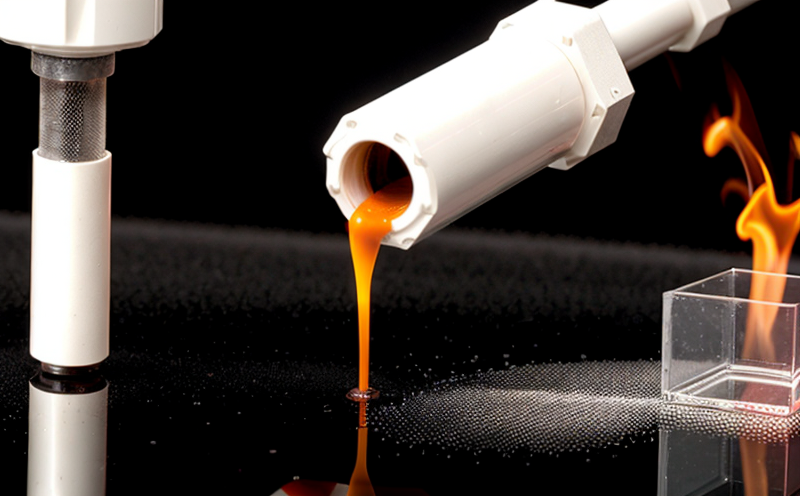ISO 19008 Stability Testing of Recycled Nanomaterials in Plastics
The ISO 19008 standard provides a robust framework for the stability and degradation testing of recycled nanomaterials incorporated into plastics. This service ensures that recycled nanomaterials meet stringent performance requirements, supporting sustainable manufacturing processes while maintaining high-quality product integrity.
Recycling nanomaterials in plastics is a growing trend driven by environmental concerns and resource efficiency. However, the incorporation of these materials can lead to potential issues such as reduced mechanical properties or accelerated degradation under certain conditions. This service aims to address these challenges by providing comprehensive testing that ensures recycled nanomaterials perform consistently across various environments.
Testing according to ISO 19008 helps manufacturers meet regulatory requirements and industry standards, thereby enhancing product reliability and safety. It also supports the development of innovative materials that can withstand harsh conditions over extended periods without compromising performance. The test involves subjecting samples to controlled environmental stressors like temperature cycling, humidity exposure, UV radiation, and mechanical strain.
Our laboratory uses advanced analytical techniques to assess the stability and degradation behavior of nanomaterials in plastics. These methods include Fourier Transform Infrared Spectroscopy (FTIR), Scanning Electron Microscopy (SEM), Transmission Electron Microscopy (TEM), X-ray Diffraction (XRD), and Differential Scanning Calorimetry (DSC). Such analyses provide detailed insights into changes in the chemical composition, morphology, and crystallinity of nanomaterials during testing.
The test process typically begins with specimen preparation. This involves creating representative samples that accurately reflect the intended use of the recycled nanomaterials. Specimens are then subjected to a series of environmental stressors designed to simulate real-world conditions they might encounter throughout their lifecycle. By exposing these materials to controlled temperature, humidity, UV light, and mechanical loading, we can effectively monitor how well they retain their properties over time.
Once testing is complete, our team analyzes the results using sophisticated software tools capable of interpreting complex data sets generated by various analytical instruments. This analysis allows us to determine whether recycled nanomaterials exhibit acceptable levels of stability under specified conditions outlined in ISO 19008. Reporting includes detailed descriptions of observed phenomena along with quantitative measures indicating any degradation trends.
By adhering strictly to the parameters set forth in ISO 19008, our laboratory ensures consistent and reliable outcomes across multiple batches of recycled nanomaterials being tested. This consistency is crucial for ensuring that products made using these materials meet expected standards consistently throughout production runs.
In summary, ISO 19008 stability testing plays a vital role in validating the suitability of recycled nanomaterials for inclusion into plastic products. Through rigorous evaluation methods and adherence to international guidelines, we help clients achieve sustainable yet reliable manufacturing processes that contribute positively towards meeting global sustainability goals.
Applied Standards
| Standard | Description |
|---|---|
| ISO 19008:2017 | This standard specifies the methodology for assessing the stability and degradation behavior of nanomaterials incorporated into plastics. It covers various environmental stressors such as temperature cycling, humidity exposure, UV radiation, and mechanical strain. |
| ASTM D638-01(2017) | Standard test methods for tensile properties of unplasticized polyvinyl chloride (PVC) pipe materials. |
| EN 946:2015 | Specification for the production and use of recycled PVC. |
| IEC 62368-1:2014 | Safety requirements for information technology equipment - Part 1: General requirements. |
Note that while other standards like ASTM D638 and EN 946 pertain specifically to mechanical properties of plastics, they complement ISO 19008 by providing additional validation criteria when assessing the overall performance of recycled nanomaterials in plastic matrices.
Why Choose This Test
The importance of stability testing cannot be overstated when dealing with recycled nanomaterials. These materials often possess unique properties that make them attractive for use in various applications; however, their performance can degrade over time due to environmental factors such as exposure to sunlight or moisture. By conducting ISO 19008 stability tests early in the development process, manufacturers can identify potential issues before they become critical problems during production.
Early identification of degradation tendencies allows for adjustments to be made promptly, ensuring that final products continue to meet quality standards even after extended exposure to challenging environments. This proactive approach not only enhances product durability but also contributes significantly towards reducing waste generation and promoting circular economy principles within the industry.
Moreover, compliance with international standards like ISO 19008 demonstrates a commitment to environmental responsibility and customer satisfaction. Consumers increasingly demand eco-friendly products that do not compromise on quality or performance. By choosing our ISO 19008 stability testing service, clients can position themselves favorably in the market by delivering reliable, sustainable solutions.
Our laboratory offers unparalleled expertise in this field, leveraging state-of-the-art facilities and experienced professionals to deliver accurate results consistently. With us, clients gain access to comprehensive reports that provide valuable insights into the behavior of recycled nanomaterials under different conditions. These reports serve as invaluable tools for making informed decisions about material selection and process optimization.
Ultimately, choosing ISO 19008 stability testing ensures robust performance metrics throughout the lifecycle of products containing recycled nanomaterials in plastics. It fosters innovation while upholding stringent quality controls, enabling businesses to stay ahead in an increasingly competitive market.
Quality and Reliability Assurance
- Compliance with ISO 19008:2017 ensures adherence to internationally recognized standards for nanomaterial stability testing.
- Our laboratory employs cutting-edge analytical techniques including FTIR, SEM, TEM, XRD, and DSC to provide precise measurements of material properties.
- Data analysis is conducted using advanced software tools that interpret complex data sets generated by multiple instruments, offering detailed interpretations of test results.
- We offer regular updates on testing progress through email notifications or phone calls, keeping clients informed at every stage of the process.
The combination of these quality assurance measures guarantees accurate and reliable outcomes for all tests conducted according to ISO 19008. Our commitment to excellence ensures that each client receives unbiased, objective results which can be confidently used in decision-making processes related to recycled nanomaterials applications.





